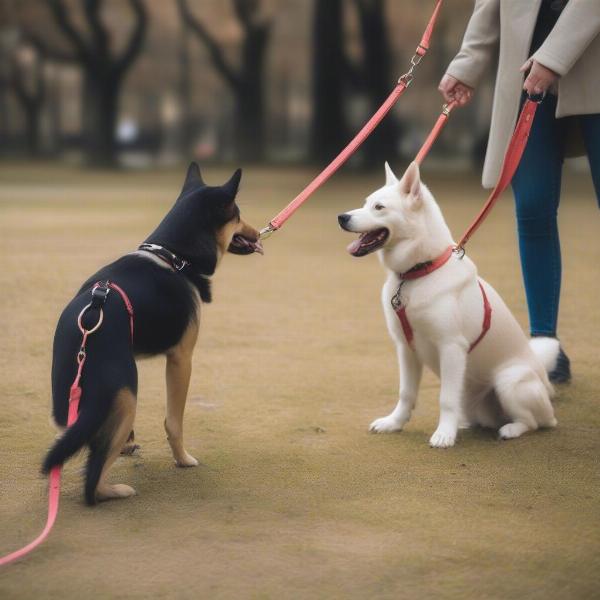The term “laughing dog mixer” doesn’t refer to a specific dog breed or a recognized canine product. It’s likely a colloquialism or perhaps a misunderstanding. However, the phrase evokes an image of happy, social dogs, which leads us to explore the important topic of dog socialization and how to create positive interactions between dogs. We’ll cover various aspects of introducing dogs, managing group play, and ensuring safe and enjoyable experiences for all canine companions.
Understanding canine communication is crucial for successful dog interactions. Dogs communicate through body language, vocalizations, and scent. Recognizing signs of stress, fear, or aggression is paramount to preventing negative experiences. A “laughing” dog might not actually be happy; panting, grinning, and even a playful bow can sometimes indicate anxiety. So, how can we ensure our dogs are truly enjoying their social time?
Decoding Canine Body Language: Is Your Dog Really Laughing?
A relaxed dog will have a loose body posture, a gently wagging tail, and soft eyes. Playful behaviors include play bows, chasing, and gentle mouthing. On the other hand, signs of stress or fear include tucked tails, flattened ears, lip licking, yawning, and whale eye (showing the whites of their eyes). Aggressive behaviors can manifest as stiff posture, a raised hackles, direct staring, growling, and snapping. Misinterpreting these signals can lead to uncomfortable or even dangerous situations.
Safe Introductions for Happy Play
 Safe Dog Introductions for Happy Play
Safe Dog Introductions for Happy Play
Introducing dogs properly is key to fostering positive relationships. Start by having the dogs meet on neutral territory, preferably a large, open space where they can approach each other gradually. Keep both dogs on leash, but allow for a loose leash so they can explore and sniff each other without feeling restrained. Observe their body language closely. If both dogs appear relaxed and interested, allow them to interact for short periods, gradually increasing the duration as they become comfortable.
Managing Group Play: The “Mixer” Environment
Supervise group play closely, especially in a “mixer” environment with multiple dogs. Ensure the space is large enough to avoid overcrowding and provides escape routes for dogs who need a break. Have plenty of toys available to redirect attention and prevent resource guarding. Be mindful of different play styles and intervene if play becomes too rough or one dog appears overwhelmed.
Creating a Positive Social Experience for Your Dog
A positive social experience is crucial for a dog’s well-being. It helps them develop essential social skills, build confidence, and expend energy. By understanding canine communication, introducing dogs safely, and managing group play effectively, we can create a truly “laughing dog” experience – one filled with genuine joy and positive interactions.
FAQ
- How can I tell if my dog is enjoying playtime? Look for relaxed body language, a wagging tail, play bows, and engagement with other dogs.
- What should I do if my dog seems uncomfortable during a play session? Remove your dog from the situation and give them a break in a quiet area.
- Is it okay to let dogs play unsupervised? No, it’s always best to supervise dog play to ensure everyone’s safety and well-being.
- How can I introduce my dog to a new dog? Start with a meet-and-greet on neutral territory, keeping both dogs on leash and observing their body language.
- What are some signs of dog aggression? Stiff posture, raised hackles, direct staring, growling, snapping, and lunging are all potential signs of aggression.
- How can I help my shy dog become more social? Start with short, positive interactions with calm, friendly dogs and gradually increase the duration and complexity of social situations.
- What if my dog becomes possessive over toys during play? Redirect their attention with another toy or remove the contested toy from the situation.
Related Articles:
(If applicable, insert links to related articles within the ilmdog.com website here)
About ILM Dog
ILM Dog is your trusted source for expert advice on all aspects of dog care and well-being. From breed selection and puppy care to senior dog health and behavioral training, we offer comprehensive resources to help you provide the best possible care for your canine companion. We specialize in dog breeds, health, training, nutrition, grooming, and products. For personalized guidance on creating positive social experiences for your dog, contact our expert team at [email protected] or call us at +44 20-3965-8624. Visit ILM Dog for more information.